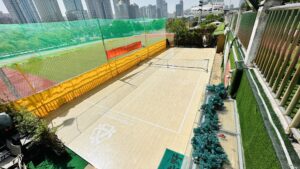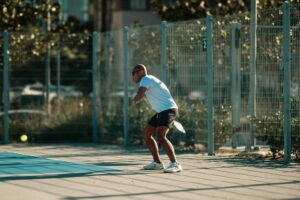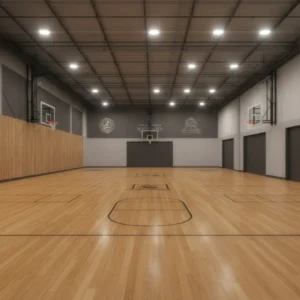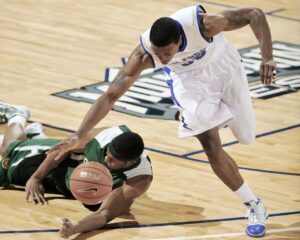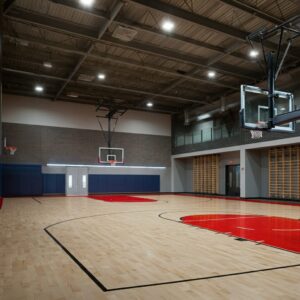When it comes to basketball court flooring in high humidity areas, choosing the right materials can make or break your game (literally). High moisture levels can cause serious damage to traditional court surfaces, leading to warping, mold problems, and poor traction. This can directly affect athletes’ performance and safety, making it crucial to select and maintain flooring designed for these conditions.
Whether you’re an athletic director, school administrator, contractor, or a private court owner, this guide provides everything you need to know about selecting the best basketball court materials for humid environments. From humidity-resistant flooring options to maintenance tips and cost insights, we’ve got you covered!
Challenges of High Humidity on Basketball Court Flooring
Humidity poses several challenges that make proper material selection essential. Here’s a breakdown of common problems caused by high moisture levels on basketball courts:
- Warping and Buckling
Excessive moisture causes wooden floors to warp or buckle over time. This uneven surface not only disrupts game flow but also increases the risk of injury.
- Mold and Mildew Growth
Damp environments create the perfect breeding ground for mold and mildew. This not only damages the flooring but also impacts air quality, posing health risks.
- Reduced Traction and Surface Degradation
High humidity can make the flooring surface slippery and decrease grip, particularly on hardwood or other natural materials. This is dangerous for athletes relying on traction for movement.
By understanding these challenges early, you can better evaluate flooring options before committing to an expensive installation.
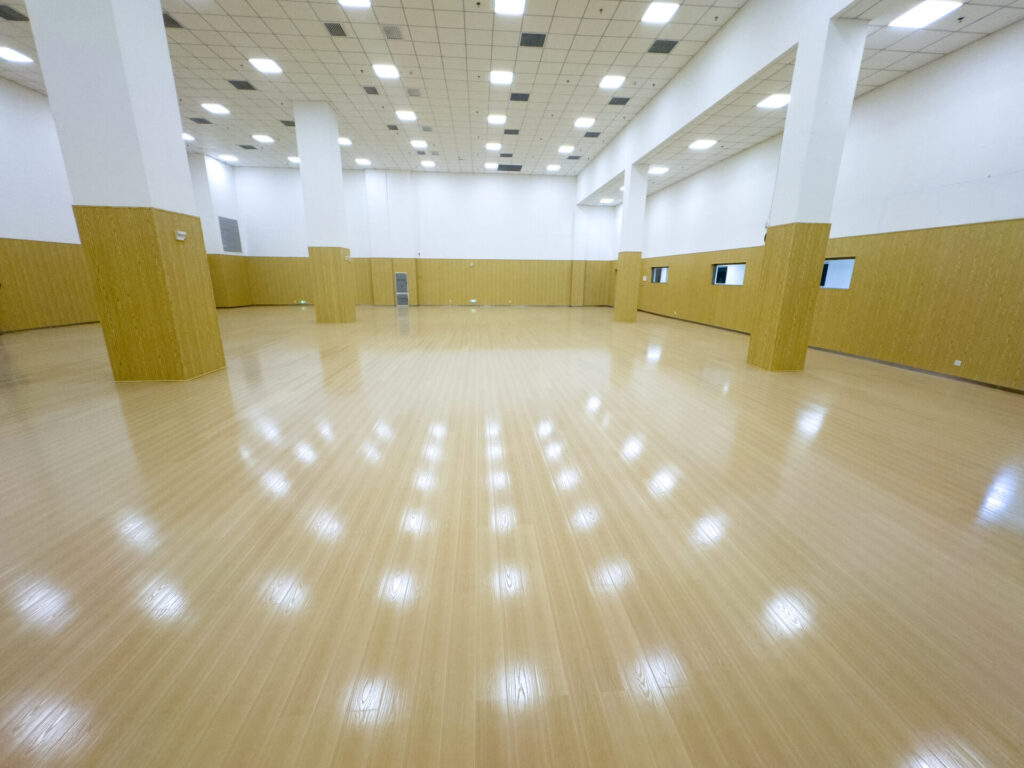
Best Flooring Materials for High Humidity Areas
When it comes to basketball court flooring, not all materials are suitable for high-humidity conditions. Below is an analysis of the top options, including their pros and cons.
1. Synthetic Court Flooring
Synthetic floors are a popular choice for their durability and low maintenance in humid environments. With moisture-resistant properties, they hold up well in both indoor and outdoor courts.
- Pros: Waterproof, affordable, requires minimal maintenance.
- Cons: Lower shock absorption compared to wooden floors.
2. Modular Court Tiles
Modular tiles are made from polypropylene or similar materials. These tiles snap together, creating a customizable and highly durable surface.
- Pros: Easy installation, water-resistant, suitable for outdoor basketball floors.
- Cons: Less traditional feel compared to hardwood.
3. Hardwood Basketball Floors with Biomass Enhancement
Not all hardwood is created equal. Modern options like Coposports Biomass Sport Wooden Flooring are designed to resist water damage while offering the classic feel players love.
- Pros: High-performance surface, waterproof, excellent bounce qualities.
- Cons: Higher upfront cost, but long-lasting.
4. Outdoor-Specific Coatings
For outdoor areas, specialized finishes and rubberized coatings can protect surfaces from moisture damage.
- Pros: Durable in extreme weather, cost-effective.
- Cons: Installation requires experienced contractors.
Each option comes with unique benefits, so understanding your specific requirements (e.g., indoor vs. outdoor, budget constraints, usage frequency) is critical.
Maintenance Tips for Humid Conditions
Even the best flooring materials need proper care to last. Here are some tips to maintain basketball court flooring in high-humidity areas:
- Control Indoor Humidity
Use dehumidifiers and HVAC systems to maintain optimal humidity levels around 40-60%.
- Regular Cleaning
Remove moisture buildup promptly to prevent mold growth. Use approved cleaning agents that won’t damage the surface.
- Inspect for Damage
Conduct regular inspections for warping, cracks, or other signs of water damage. Address issues early to avoid larger repairs.
- Apply Protective Coatings
Use moisture-resistant sealants or coatings annually to improve longevity.
Proactive maintenance not only extends the life of your flooring but also ensures player performance and safety.
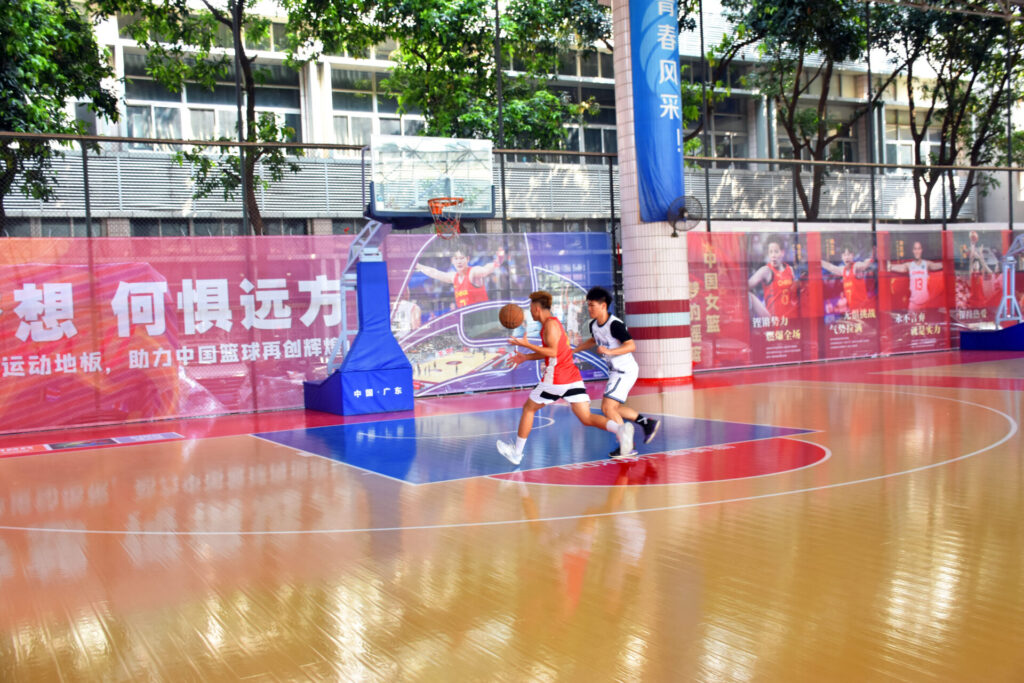
Choosing a Qualified Contractor
Selecting the right contractor for installation is just as important as choosing the flooring material itself. Ask these questions to vet potential contractors:
- Are they experienced in installing basketball court flooring?
- Can they provide references or case studies for similar work?
- Do they offer warranties or ongoing support for their installations?
A knowledgeable contractor ensures proper installation, which is key to maximizing the lifespan of your court.
Create a Court That Stands Up to Humidity
Selecting the right basketball court materials for high-humidity conditions doesn’t need to be overwhelming. By understanding the challenges, exploring material options, and following maintenance best practices, you’ll create a court that’s durable, efficient, and safe.
If you’re ready to take the next step, Coposports Biomass Sport Wooden Flooring combines cutting-edge performance with waterproofing technology, making it the ideal solution for these environments.
Contact our experts today for personalized advice on creating the perfect court that lasts for years!


